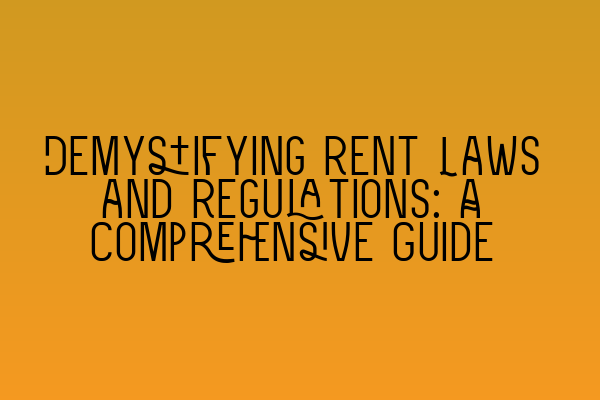Demystifying Rent Laws and Regulations: A Comprehensive Guide
Renting a property is a common practice for many individuals and businesses alike. However, navigating the complex world of rent laws and regulations can be daunting without proper guidance. In this comprehensive guide, we will demystify the intricacies of rent laws and provide you with the knowledge you need to understand your rights and obligations as a tenant or landlord.
Understanding Rent Laws
Rent laws vary from country to country and even from state to state within a country. It is crucial to familiarize yourself with the specific rent laws that are applicable to your jurisdiction. In the United Kingdom, for example, the legal framework governing rent is primarily derived from the Landlord and Tenant Act 1985 and the Housing Act 1988.
These acts lay down the rights and responsibilities of landlords and tenants, and they cover essential areas such as rent increases, eviction procedures, and repairs. Understanding these laws is vital for both landlords and tenants to ensure a fair and lawful rental agreement.
Rent Regulations for Landlords
For landlords, it is essential to be aware of the regulations surrounding rental properties. One crucial aspect is the need for a valid tenancy agreement. This agreement outlines the terms and conditions of the rental, including the rent amount, payment frequency, and duration of the tenancy.
Landlords must also comply with safety regulations, such as ensuring that the property meets the necessary standards for fire safety, gas safety, and electrical safety. Additionally, landlords have a legal obligation to protect their tenants’ deposits by registering them with an approved deposit protection scheme.
When it comes to rent increases, landlords must follow the guidelines outlined in the rent legislation applicable to their jurisdiction. In the United Kingdom, for example, landlords must provide a written notice and adhere to specific notice periods before increasing the rent.
Rights and Responsibilities of Tenants
Tenants also have certain rights and responsibilities under rent laws. It is crucial for tenants to understand their rights and ensure they are being upheld by their landlords. Some of the key rights include:
- Right to a safe and habitable property
- Right to privacy
- Right to be protected from unfair eviction
- Right to have access to necessary repairs
Tenants also have a responsibility to pay the agreed-upon rent on time and maintain the property in a reasonable condition. Failure to meet these responsibilities may lead to legal consequences, such as eviction or financial liability for damages.
Seeking Legal Advice
Given the complexity of rent laws, it is highly advisable to seek legal advice if you have concerns or questions regarding your rights as a tenant or landlord. Legal professionals specializing in property law can provide tailored advice based on your specific circumstances.
At SQE Property Law & Land Law, we offer comprehensive legal services for all aspects of property law, including rent laws and regulations. Our team of experienced solicitors is well-versed in the intricacies of rent legislation and can provide expert guidance to landlords and tenants alike.
If you would like to test your knowledge of property law or prepare for the SQE exams as a solicitor, we offer SQE 1 Practice Exam Questions and SQE 1 Practice Mocks FLK1 FLK2 to help you prepare effectively. We also provide SQE 1 and SQE 2 Preparation Courses to support your learning journey.
Stay up to date with the latest SRA SQE Exam Dates to ensure you plan your studies and exam schedule efficiently.
Conclusion
Rent laws and regulations play a vital role in ensuring fair and lawful rental agreements between landlords and tenants. Understanding these laws is crucial for both parties to protect their rights and fulfill their responsibilities. Seek legal advice when needed and consider utilizing the resources and courses offered by SQE Property Law & Land Law to enhance your understanding of property law and prepare for the SQE exams.
